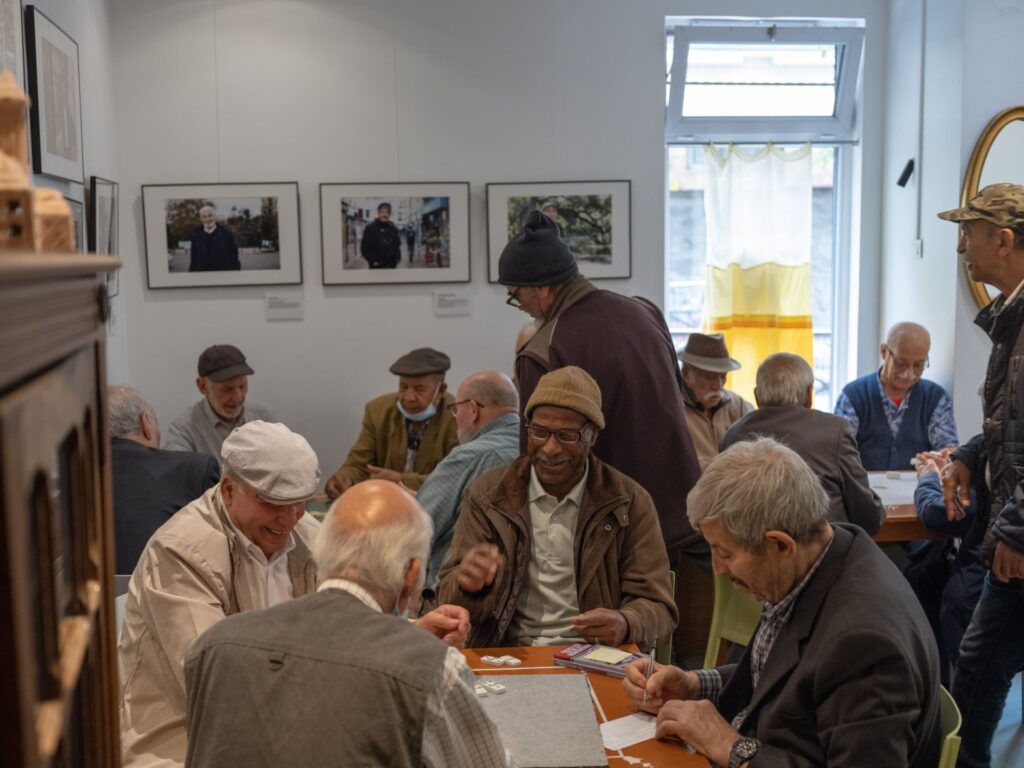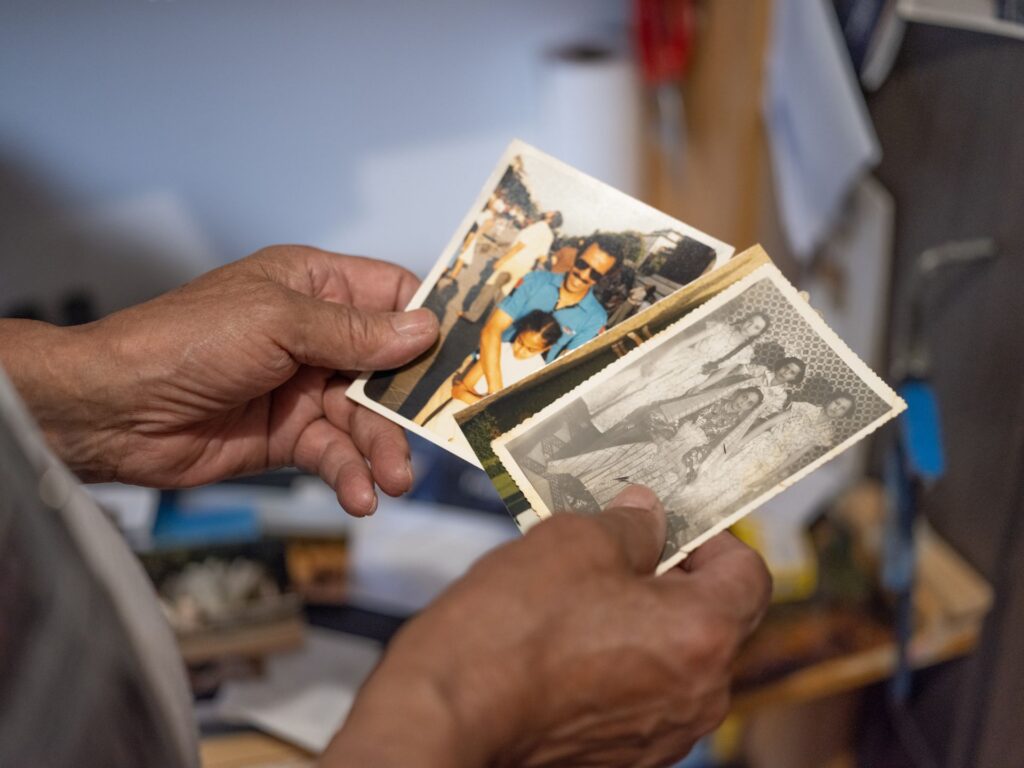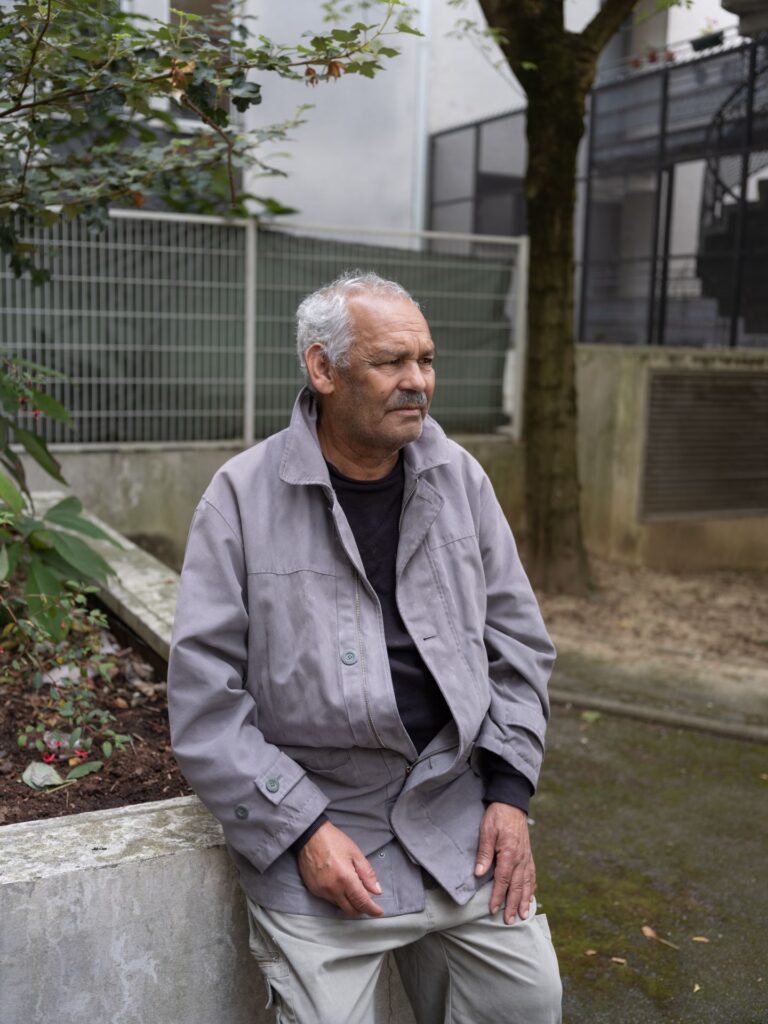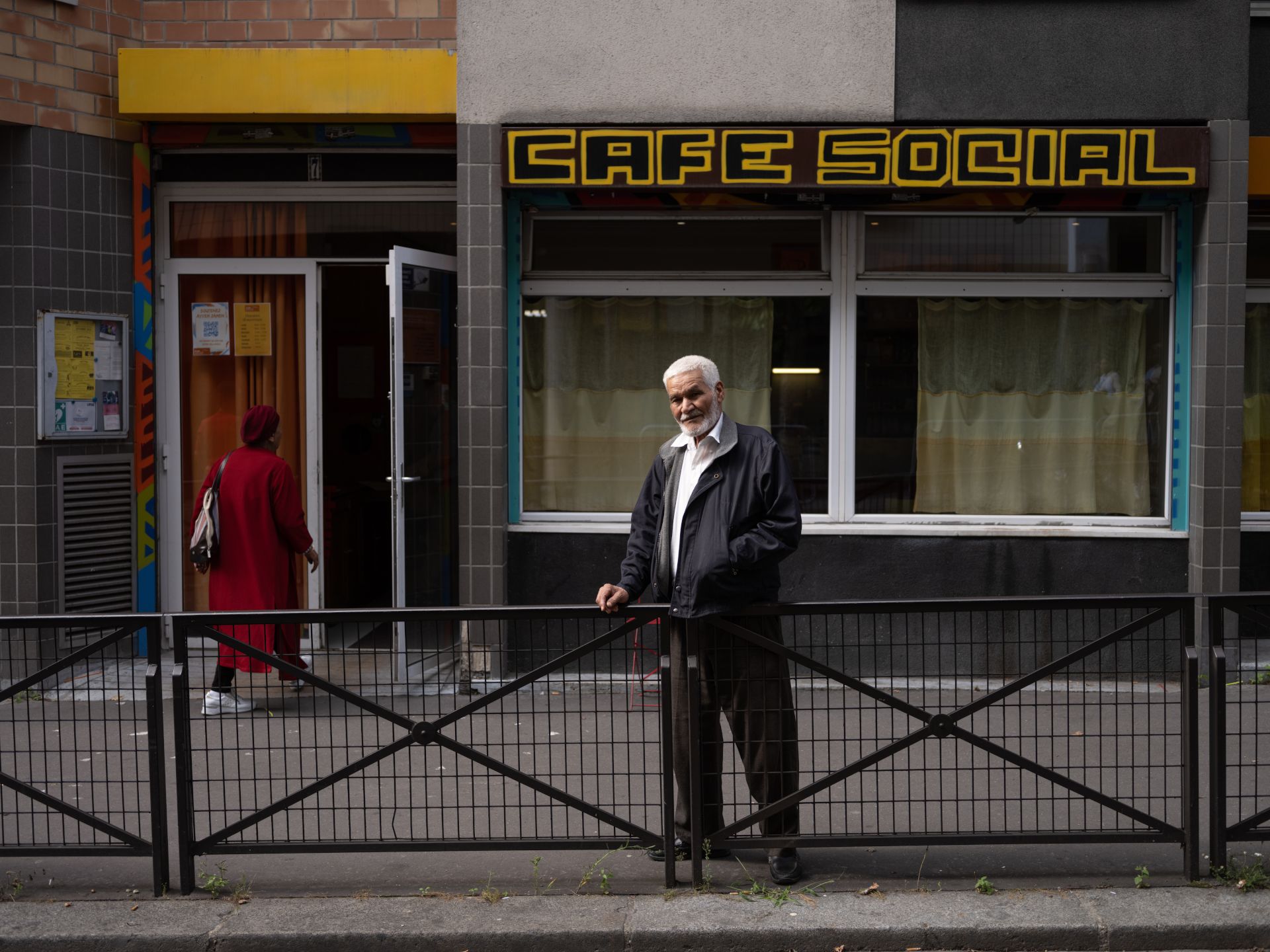Listen to this story
The elderly men come to the cafe to play cards and dominoes, drink coffee and, above all, chat. Sometimes it is about their children or grandchildren. Sometimes it is about sports or politics or the miserable weather in Paris. Often, it is about home, or what used to be home — Morocco, Algeria, Tunisia.
“We all thought we would come to France to work, collect some money and go home,” says Hassan Chrifi, a spry 83-year-old Moroccan man with close-clipped white hair and a mustache. “Nobody came to stay. And then we did. We had children, and that was it. Now, I’ve lived here more than there. I don’t have friends in Morocco any longer. I don’t even know my family anymore.”

Situated on an unassuming block in Paris’ 20th arrondissement, Ayyem Zamen, which translates to “the good old days” in Maghrebi Arabic, is modest, even a little dated, with old wooden tables and mismatched folding chairs. But the social cafe is an anchor for hundreds of aging North African immigrants who live in a kind of existential limbo — despite having spent most of their lives in France, they do not feel French. Nor do they feel fully Algerian, Tunisian or Moroccan.
They are called “chibanis” in France — the word means “white haired” in Arabic dialect — these men who came to work and ended up either starting their families here, bringing them from their homeland or spending their life on their own in exile. Now, as they age, they are confronting the realities of a myth, built over decades by both the state and the immigrants themselves: the myth that one day they would return home.
Chrifi, who is a regular at Ayyem Zamen, came to France in the late 1950s and spent the next four decades working a range of jobs — largely in manual labor, except for a stint as a circus worker — and planning his return to Morocco. He married in his homeland, bought a house there and even returned to North Africa for a few years in the ’60s. But, as the decades crept on, he found that there were more things keeping him in France than drawing him home: a health scare or two, work opportunities, inertia. More than half a century later, he has come to accept a grim truth: “I’ll only go back to my country in a box.”
This idea of returning home is not unique to North Africans in France — it is part of many migration stories. But as the largest immigrant community in the country and the first one to come en masse from former colonies, the chibanis and their families have a specific story with, and in, France.
Immigrants from France’s colonial empire, mainly from North Africa, and especially from Algeria, arrived in great numbers during the “Trente Glorieuses,” the 30-year period following World War II when France needed cheap labor to reconstruct and develop the country after the conflict. To facilitate the flow of labor, France eased migratory restrictions, sometimes even paying passage for workers. Hundreds of thousands of North Africans emigrated, working to send money home in the midst of decolonization.
But in the minds of both the immigrants themselves and the French government, they were never supposed to stay this long. In fact, the myth of return has become a key point in French sociopolitical history, based on what the sociologist Ahmed Boubeker calls the “reciprocal lie” forged between French authorities and North African migrants in the mid-20th century. In a relationship still deeply colored by colonialism, both sides considered that they were part of a temporary movement. “France viewed them simply as workers and believed that these people could live for decades without rights or any social life,” he explained, pointing to initially shoddy family reunification policies based on the assumption that workers would not need or want to have their families with them in France. “And immigrants thought of their time here simply as an intermediate stage, before going back.”
For the French sociologist and anthropologist Nacira Guenif, whose work focuses on immigration, return was not just a myth but a feature baked into the system. “For France, it was a tangible objective, one of the conditions to import this flexible workforce,” she told New Lines. “For the migrants, it was something they aspired to, which drove the departure from their homeland.”
This hope of returning home can be stronger for those who had a difficult life in France, particularly those who came in the postwar years, taking demanding jobs in automobile factories or on public work sites, as farm laborers or steelworkers. Their jobs were physically demanding, sometimes dangerous, poorly paid, repetitive and easily replaceable. “The poverty and the precariousness were such that the only way to hold on was to think: ‘We suffer, we put up with it. But one day, we will return,’” Boubeker explained. “In a way, they remained on the sidelines of French society. It was a transit that lasted for decades, with sacrificed fates.”
At the social cafe, Mabrouk Halmous, who was born in Tunisia in 1942, called his the “generation of suffering” — the one that sacrificed everything for the next. It showed on his face — deeply wrinkled and weathered — and in his voice, which carried a note of bitterness and resignation. The father of eight recounted working a series of exhausting jobs, from truck driver to construction worker, to ensure his children could get an education and lack nothing. “I gave up my youth, my health and my time. What’s keeping me here now?” he asked.

One of the things keeping him in France is a tangle of administrative issues: Retiring in one’s home country, while keeping a pension and sometimes social security benefits from the years worked abroad, can be difficult. For example, France provides a minimum old-age pension for people over 65 who receive less than about $1,000 per month. But to be eligible for this benefit, you must live in France for six months a year. Next year, the residency requirement to get that stipend will go up to nine months per year. It’s part of a targeted campaign to limit social allowances for non-French workers. In a recent interview, Finance Minister Bruno Le Maire specifically targeted North Africans. The French were “fed up with fraud,” he said. “They have no desire to see people receive aid and send it back to North Africa or elsewhere.”
“It used to be way easier to come and go,” Halmous lamented. “We didn’t come to France asking for charity. We are not outlaws.”
“It is as if their presence in France continues to be experienced in the shadow of this injunction: You come here, but once you are no longer useful at work, you will go back. As if we have never been able to completely detach ourselves from this expectation, and consider that they did not fulfill their side of the deal,” Guenif said. “It is probably also because the French state still doesn’t fully accept their presence that the myth of returning home won’t die a natural death.”
There was a time, however, when the myth of return seemed ready for the grave: In the 1970s, after the first oil shock, economic crisis and mass unemployment struck France. Joblessness hit immigrant men, who already lacked labor rights, first. When the bottom fell out of the labor market, they then had to deal with a xenophobic national climate that linked unemployment and immigration. In 1974, the government put an end to economic immigration. The first “repatriation grant” was created in this context in 1977: It allocated 10,000 francs (the equivalent of about $1,600 today) to immigrants who would leave France for good.
After decades of calling North Africans to work in France, the country was effectively telling them, “Take 10,000 francs and get lost!” as the title of a 1982 Franco-Algerian slapstick social comedy about the grant said plainly. And, of course, it mostly did not work.
Halmous recalls that time. “At first, they opened the door for us like cattle. We followed without knowing where we were going; we just heard that there was work.” When the work disappeared, the country hoped the immigrants would too. “After years of bosses coming looking for workers, of companies lining up to hire us, we started hearing on construction sites, ‘We don’t need you anymore. Go home.’”
Halmous refused the grant, knowing that accepting it would mean giving up his rights and making the time he spent in France come to naught. “We have brought France up, and it is France that benefited from it,” he said.
“What were they going to do back home?” Guenif added. “Ten thousand francs was nothing. They were not fooled by the state’s speech, which offered too little, too late.”
By that point, their children were becoming French and advocating for their rights. Family reunification policies, which allowed migrant workers to bring their spouse and children from their home country under certain conditions, had already gone into effect. A new generation — sometimes two — had been born in France and knew nothing else. By the early 1980s, France had to finally admit that the North Africans were there to stay — even without considering them as completely French. The myth eroded on the side of the state. It became somehow a failure, “something foundational but that couldn’t be realized,” according to Guenif.
But if the myth of returning home belongs to the past as an official public policy on a collective scale, it still affects an overwhelming number of migration paths and has consequences for new generations of immigrants and their descendants.
One of the most visible manifestations of the myth is the houses. All across North Africa there are homes owned by immigrants, built for their retirement — and as a symbol of their hope to live there. Financing for those homes often comes through a major sacrifice in the quality of life of the immigrant in France, where most will never access homeownership. In fact, some of the chibanis still live in the run-down workers’ hostels built on the outskirts of Paris in the 1950s that were, like the workers, intended only to be temporary. As a result, many have gone decades without renovation, while their tenants age with them. Back at home, the houses built with remittances remain empty for years, sometimes forever.
Moncef Labidi, who founded Ayyem Zamen, has seen this story play out again and again. “People build castles that they don’t occupy, and would rather live in a small worker’s studio here,” he said. “This is part of the migrant’s status: He has to participate in building there, to protect his family. He thinks that when he retires, he will get the comfort he never had here.”
Even outside the most disadvantaged classes, giving up on the idea of return can be painful. “I returned thinking it would be permanent in 2005,” said Thouraya Saddoud Azaiez, a Tunisian woman in her late 40s. “It was the most beautiful year of my life.” She said she had wanted her children to be raised with their family, as she was, but they struggled to adapt. “Everything was different, they missed a type of comfort, they were very critical.”
Her children’s rejection of her homeland pushed Saddoud to return to Europe, but accepting that Europe was her future threw her into an emotional tailspin. When she questioned whether her children’s response was normal, her doctor told her the heavy truth: “He said, ‘They have Tunisian origins, but they are not Tunisian, they grew up here.’ I had a really hard time accepting that. I continue to say it’s their country.”

For many of the older generation of immigrants, it’s their children — who were born in France and attained French citizenship at age 18, or sometimes even before — who keep them in Europe. Cherifa Ouadenni, 81, who came to France from Algeria in 1965, remembers crying about her children’s future weddings. “None of them married someone from home. I thought I would get them engaged, marry them back there. And they got married on their own.” She is now staying in Paris to be close to them and her grandchildren, even though she bought a house in Algeria years ago to spend her retirement there.
When immigrants spend years or decades far from their home country, not only their children but they, too, struggle to find their place when they go back, whether on vacation or permanently. Labidi once asked a patron where he felt more at ease — in France or in his home country. The man replied: “On the plane.”
“I feel like a stranger here and a stranger there” is a sentence that echoed in almost every interview. In the sociology of migration, this is called “double absence.” Some explain that they feel like their country is just trying to get money out of them. Others say mindsets “changed too much” in the intervening decades.
Ezzedine Gam left his country in 1985, to study law in France and then help improve the Tunisian legal system. “From the beginning, I had the idea of returning after finishing school. I spent three years trying to get back,” he said. But he found that the career landscape back home was difficult, and Tunisians coming from abroad were frowned upon in the job market. “We were swimming against the tide: People were trying to get out and we were doing the opposite,” he said. The professor still wants to return after retiring; he has grand plans to build libraries in schools to give back something to his homeland. “Retirement is the beginning of real life for me. The time to do what I couldn’t when I had other professional and family commitments.”
Then there are the family dynamics that shift during long absences. Maia Lecoin, who manages Ayyem Zamen, said many of the men who left their families at home have experienced crushing guilt over not being more involved with their children. “The more time they spend away from home, the more these ties weaken. It’s very difficult for them to come back after retirement,” she said, in spite of what they had planned.
Ouadenni, who was chatting with an acquaintance at one of the cafe’s tables, recalled the painful realization she had after her mother’s death that her brothers had her removed from the will, thinking “Why would she get an inheritance? She is living in France, she will never come back.” A handful of the people New Lines talked to recounted how they built a house back home, only for it to be occupied, or sometimes sold, by relatives.
As they age, many of the chibanis stay in France to access health care that is lacking in their countries of origin. But with that comes a deep and abiding fear: dying in France, having never returned home.
Thouraya recounted with sorrow the story of a friend who met such an end. “He bought a piece of land in Tunisia, built his house, made a farm, a henhouse, planted trees. He worked all his life for that. Here, he just had a small apartment. I used to tell him, ‘Buy a bigger one, with a garden,’ and he replied, ‘No, for me it’s Tunisia.’ Last year, he was so happy to retire, and then he died, without even enjoying it.”
But death can also finally solve the impossible question for the chibanis. “When they left, they made a promise to their relatives that they would return,” said Labidi. “For many, the promise is only finally kept by their coffin.”
In fact, the importance of repatriating their body and being buried on home soil is a frequent topic of conversation at the cafe, said Lecoin. She said the pandemic in particular shook the community. “Not only were they unable to attend major events with their families, since the usual round trips were blocked, but there was also a great fear of dying here without being able to be buried there.”
As the postwar generation fades, the myth of return is gaining a new chapter — that of the second and third generation. Some of these children keep strong ties with their parents’ home countries. Others don’t, much to the chagrin of the earlier generation. Most of them don’t envision living in a country they never knew; it would be a departure and not a return. “Our generation has been brought up on the myth of return,” Boubeker, the sociologist, explained. “I lived in the nostalgia of a country I didn’t know. It was transmitted by our parents, and it was a betrayal of their dream to think that we wouldn’t go back there.”
Guenif studied this younger generation, which had to overcome the myth and recognize it was not a failure to have stayed. They saw the harm it did to their parents, did not want to organize their life with the same expectation and put their energy toward where they were living instead. They are also the ones who carried out the antiracist struggles of the 1980s, recognizing that their future was in France and that they deserved rights here. “The younger generations live this return in a practice of going back and forth. They travel to their hometown, reconnect with their history, are attached to it,” she said. “For them, it’s no longer about making a heartbreaking choice between staying and leaving. The myth belongs to the parents and grandparents who came to France for the first time. The next generation experiences it mainly in terms of family narrative.”
When they can afford it, some of their parents, too, find balance in these round trips, dividing their time between here and there. An intermittent return, rather than a permanent one, can solve the question, especially now that traveling is easier. “I found my stability in the in-between,” said Houda, who came in 1982 and is now among the few that travel four or five times a year to Morocco. “The myth of returning home never stops, unconsciously. But I know I will never live there.”
This article was published in the Fall 2023 issue of New Lines’ print edition.
Become a member today to receive access to all our paywalled essays and the best of New Lines delivered to your inbox through our newsletters.



